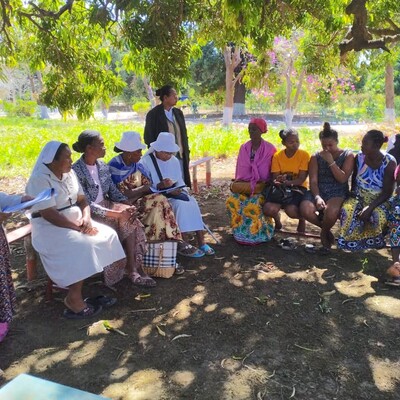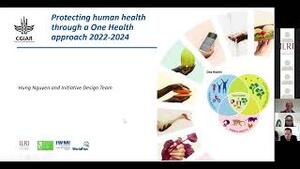
Ecosystem approaches to the better management of zoonotic emerging infectious diseases in the Southeast Asia region
The Ecosystem Approaches to the Better Management of Zoonotic Emerging Infectious Diseases in Southeast Asia (EcoZD) project worked directly with more than 100 key zoonotic emerging infectious diseases management actors across eight multi-disciplinary teams in six countries to attain project outcomes and deliver substantial outputs. Ecohealth experts were mobilized from within and outside the Southeast Asia region.
The project met its primary objective, which was to increase the capacity of researchers and implementers to use novel ecohealth approach for better control of zoonoses; this was documented using outcome mapping and ecohealth uptake assessment. The project produced research outputs, with more expected over the next two years, but EcoZD was as much about understanding teams’ knowledge, attitude and practice in relation to ecohealth and how ecohealth could lead to outcomes on a pathway to better health for people, animals and the environment. This better understanding of ecohealth has also been achieved and will be shared widely.
The project strengthened research capacity and introduced the ecohealth approach using workshops (for individual and multiple teams) and individual mentoring by experts from ILRI and partners within and beyond the Southeast Asia region. During the induction phase, key actors dealing with zoonoses (principally biomedical) were often not convinced of the need to add environmental and social science experts. By the end of the project, they emphasized the utility of social science approaches in important policy meetings. While forming teams and introducing ‘learning by doing’, involvement of social scientists was encouraged, as well as promotion of the use of qualitative tools (e.g. participatory methods) to complement quantitative tools favoured by the biomedical team members. Individual champions were a key to the uptake of ecohealth.
Because ecohealth was a novel concept to most of the researchers, a steep learning curve was anticipated. Following ecohealth and other workshops, developing research proposals that demonstrated research teams were conceptualising beyond a standard veterinary public health approach was challenging, especially in countries with the most rigid/formal systems in place and where inter-sectoral cooperation had been previously limited.
Objectives and outcomes were critically reviewed in mid 2010. Along with amendments based on the circumstances described above, the project team incorporated other changes based on the vision, mission and outcome challenges proposed by the local technical partners at the outcome mapping training workshop in 2009.
While not in the original proposal, the project team conceptualized and developed two Ecohealth Resource Centres (EHRCs) to be embedded at two universities and linked to other Centres in Vietnam and India. The roles envisioned for the EHRCs were advocacy (an ecohealth symposium on policy was held at Chiang Mai, Thailand), undertaking ecohealth research and developing curricula and training courses for undergraduates, postgraduates and others. Both centres developed open access training manuals. Their establishment will improve the sustainability of ecohealth in Southeast Asia.
Because the project was focused on changing knowledge, behaviour and attitude, as well as generation of science outputs, progress was relatively slow. In a common model for research in Asia, external actors lead the development of projects, obtain funding from donors, define research questions, and take the lead in analysis and writing up. Our emphasis on capacity building implied an approach where teams made key research decisions and took the major role in analysis and write-up. At the same time, we recognized the need to ensure public funded research led to publically available evidence, and towards the end of the project there was additional involvement of scientists in support roles.
The project team, including all country research partners, gave 16 oral and 5 poster presentations of key research outputs at the International Association for Ecology and Health conference in Kunming. The last official project activity in October 2013 was the participation in the ecohealth conference in Côte d’Ivoire where the project team delivered 5 presentations. The team also had the opportunity to present the project and its research outcomes at many other national and international meetings. Typical outcomes included convincing policymakers in Bali to extend the project model of community workers to the entire island; publishing a policy brief in the Thai government journal; successfully implementing ecohealth curricula in two universities; extension of student community work in Indonesia; and obtaining new funding from the provincial government of Binh Phuoc in South Vietnam to expand the research activities beyond the study sites in the province.
Further outputs will be generated beyond the project life with funding support from the CGIAR Research Program on Agriculture for Nutrition and Health (A4NH). These outputs include peer-reviewed journal articles, policy briefs and online resources. The team will also continue to document current and emerging outcomes.
Summary of project outputs and outcomes
| Outcome | Theme | Output |
| Capacity built | Ecohealth research: learning by doing | Over 100 researchers in Southeast Asia involved in 9 projects in 6 countries Over 20 ILRI scientists and external science leaders exposed to ecohealth |
| Training courses | Three major ecohealthcourses | |
| Short courses and lectures | More than 20 lectures given | |
| Graduate fellows | Four MSc theses on ecohealth
| |
| Training in research methodologies | Participatory learning and action; focus group discussions; outcome mapping; risk analysis | |
| Research disseminated | Peer-reviewed articles | 3 published in international journals 10 published in local journals 10 under preparation |
| Presentations at conferences | 51 presentations/posters at 12 conferences | |
| Presentations at other meetings | 12 presentations/posters at national and regional meetings and initiatives | |
| Sustainable ecohealth in the region | Regional institutions | Two EcoHealth Resource centres established and supported One centre supported (Centre for Public Health and Ecosystem Research, Vietnam) |
| Training manuals | Two ecohealth training manuals developed | |
| Policy influenced | National | Five teams engaged with national policy makers 4 sets of policy briefs
|
| Regional and international | One regional symposium for policy makers Project engagement in FAO, WHO and OIE initiatives Ecohealth incorporated into A4NH |





















